DIY 6HP26 Pump Inlet Flush
#1
Thread Starter
New Members
Joined: Jul 2014
Posts: 212
Likes: 0
From: brisbane
My Ride: 2007 E60 530d
Model Year: 2007
Engine: M57
Hello.
My 2007 530D has now done 70000km and is about 8 years old so I decided to do an ATF flush. Most of what I did follows KyleB's excellent post which can be read here
https://5series.net/forums/diy-do-yo...thread-137584/
I decided however to try something a little different after reading this web page and do a pump inlet flush - Transmission Flushing.
Since I was replacing the pan I could use the old pan as the adapter for the pump inlet flush machine (a bucket and hose).
First drain the fluid and remove the old pan. Drill down the inlet pipe of the old pan to get the centre of the pipe near the pan floor.
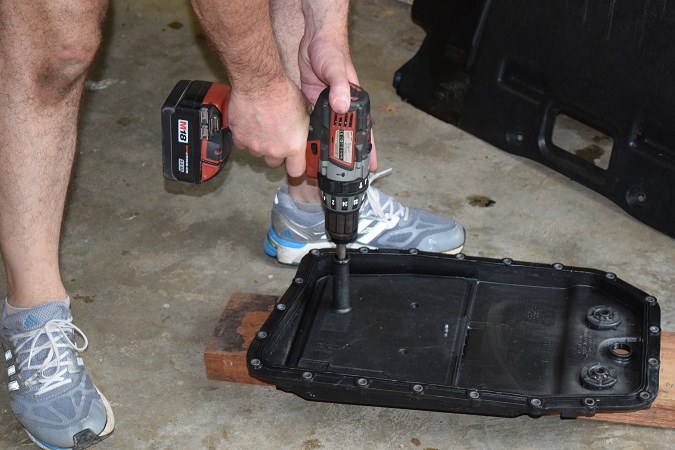
Then use a hole saw (45mm worked fine) from the other side to create a big hole for the old fluid to exit and the hose to attach inside the inlet pipe. Stop drilling when you cut through the filter material.
Clean and dry the pan thoroughly so no debris can enter the transmission.
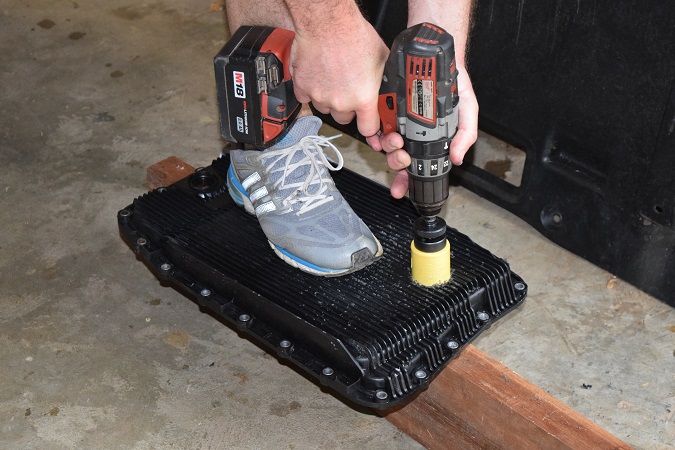
I used a length of ATF resistant black hose. One end has been tapered a bit using a belt sander so it is a snug fit and wont fall out.
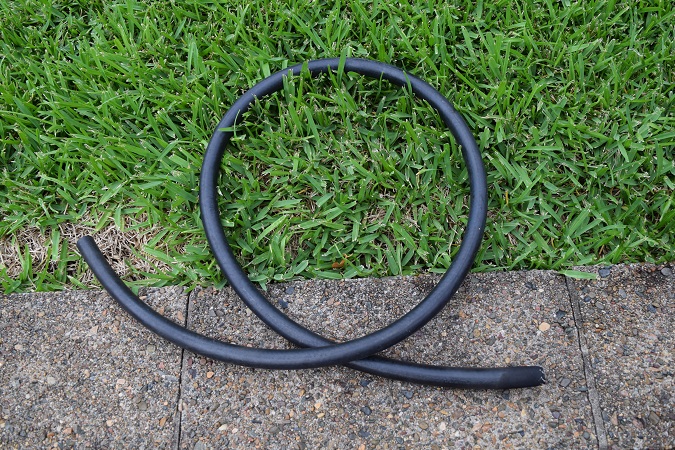
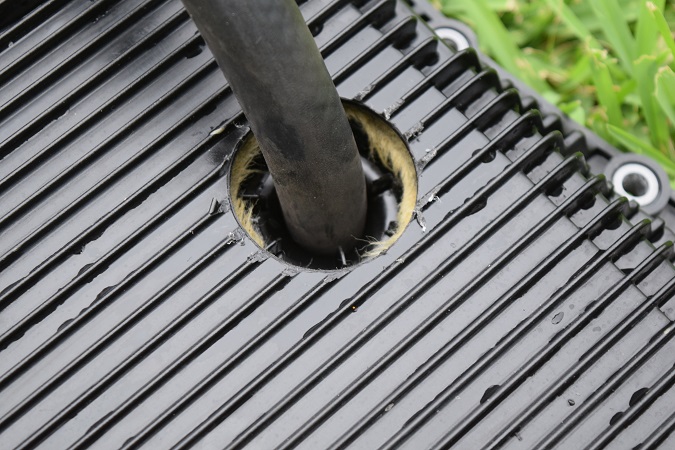
Then bolt the pan up again - I used only 4 bolts that were hand tight. There is a cable tie threaded through a pan bolt hole helping the hose stay in place.
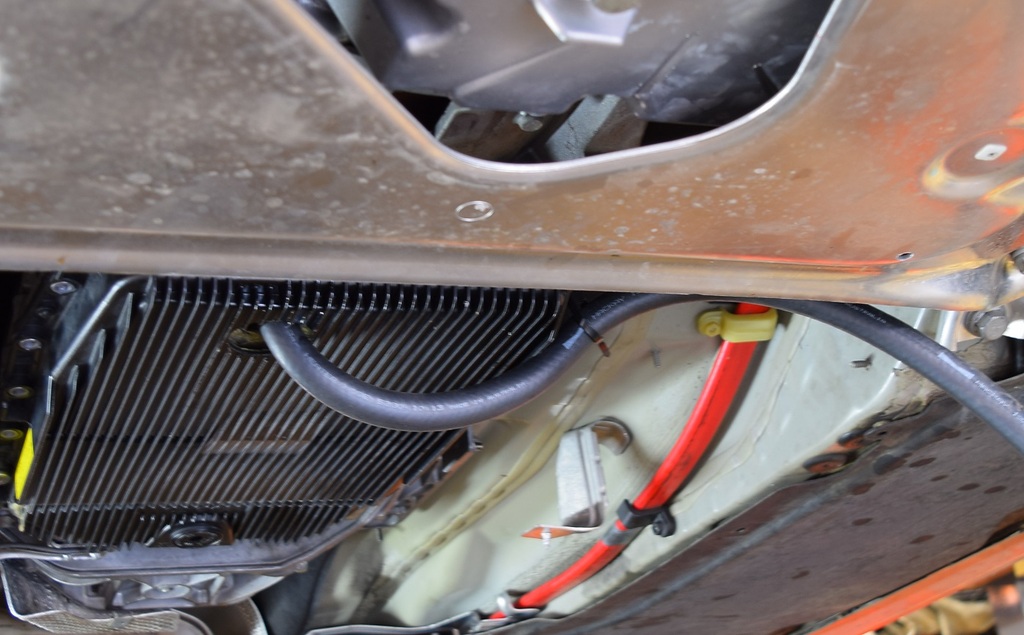
The main part of the machine was made from a 20 litre bucket with a garden hose fitting screwed in place plus some hot melt glue.
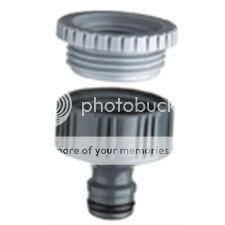
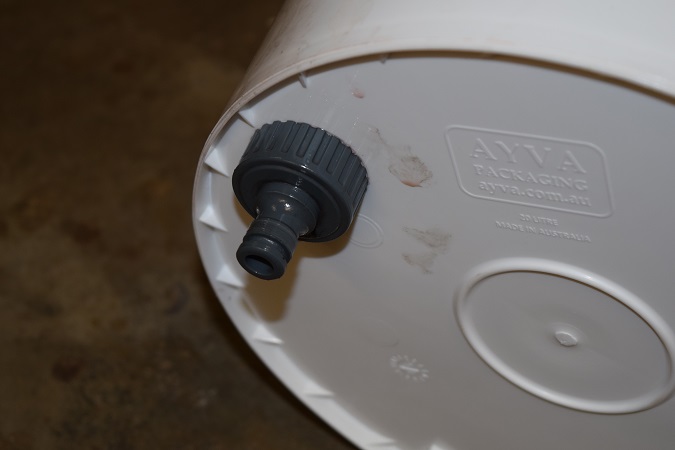
Now fill the machine with all the new ATF except for about 5 litres for the final pan fill.
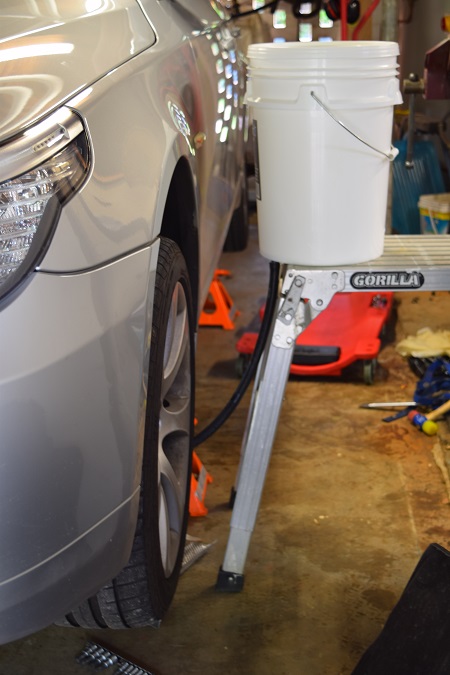
I followed the refill gear change procedure that is described in this document on page 6 (reverse, drive, shift to third).
http://www.zf.com/media/media/docume...hselkit_EN.pdf
It helps if you have a volunteer to do the shifting while you monitor the fluid level - it goes down pretty fast.
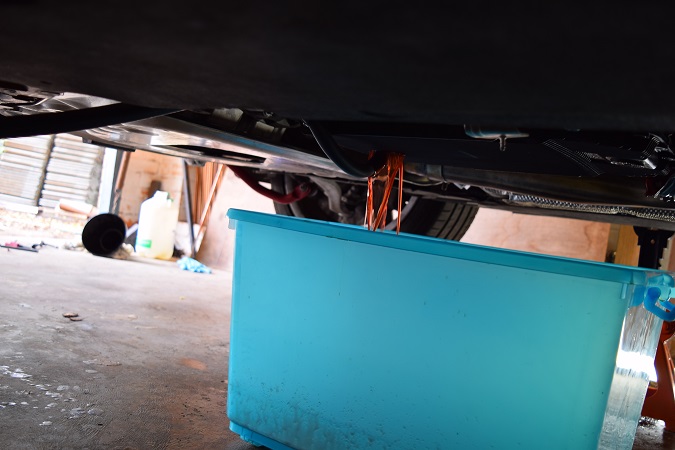
I don't know how much of the original fluid was left - I used 16 litres to flush 10 litres. The initial drain came close to 5 litres.
The old fluid smelled OK I suppose and not burnt and was a little brown. There were a few small "bumps" of metal dust on the magnets.
From here the new pan is installed and its back to KyleB's instructions including INPA reset adaptations.
In addition I also changed the mechatronic sleeve and the bridge seal. The sleeve was a real pain. I had to lower the transmission slightly for it to pass by and plugging the cable back in was pretty hard too. Maybe this is a difference between the 6HP26 and the 6HP19.
My 2007 530D has now done 70000km and is about 8 years old so I decided to do an ATF flush. Most of what I did follows KyleB's excellent post which can be read here
https://5series.net/forums/diy-do-yo...thread-137584/
I decided however to try something a little different after reading this web page and do a pump inlet flush - Transmission Flushing.
Since I was replacing the pan I could use the old pan as the adapter for the pump inlet flush machine (a bucket and hose).
First drain the fluid and remove the old pan. Drill down the inlet pipe of the old pan to get the centre of the pipe near the pan floor.

Then use a hole saw (45mm worked fine) from the other side to create a big hole for the old fluid to exit and the hose to attach inside the inlet pipe. Stop drilling when you cut through the filter material.
Clean and dry the pan thoroughly so no debris can enter the transmission.

I used a length of ATF resistant black hose. One end has been tapered a bit using a belt sander so it is a snug fit and wont fall out.


Then bolt the pan up again - I used only 4 bolts that were hand tight. There is a cable tie threaded through a pan bolt hole helping the hose stay in place.

The main part of the machine was made from a 20 litre bucket with a garden hose fitting screwed in place plus some hot melt glue.


Now fill the machine with all the new ATF except for about 5 litres for the final pan fill.

I followed the refill gear change procedure that is described in this document on page 6 (reverse, drive, shift to third).
http://www.zf.com/media/media/docume...hselkit_EN.pdf
It helps if you have a volunteer to do the shifting while you monitor the fluid level - it goes down pretty fast.

I don't know how much of the original fluid was left - I used 16 litres to flush 10 litres. The initial drain came close to 5 litres.
The old fluid smelled OK I suppose and not burnt and was a little brown. There were a few small "bumps" of metal dust on the magnets.
From here the new pan is installed and its back to KyleB's instructions including INPA reset adaptations.
In addition I also changed the mechatronic sleeve and the bridge seal. The sleeve was a real pain. I had to lower the transmission slightly for it to pass by and plugging the cable back in was pretty hard too. Maybe this is a difference between the 6HP26 and the 6HP19.
Last edited by ripley; 12-30-2015 at 02:11 PM.
#4
New Members
Joined: Jan 2024
Posts: 2
Likes: 0
From: Amsterdam
My Ride: 2009 E61 525xi with N53 (PV31)
Model Year: 2009
Engine: N53B30
I think this thread deserves more attention than it seems to have gotten, I stumbled upon it after much research and scouring of forums. I posted a link to it in this Jaguar forums thread (I've got a BWW, but that discussion was more substantial, so I replied there).
I'm not expecting a reply here, this is an old thread, and the poster isn't recently active on this forum, but just in case...:
As noted there the one thing I don't get about this tutorial is why you used an ATF hose for the inlet, as noted there I'm assuming it's a "just because", since the fluid or hose itself will never get up to temperature, so a transparent PVC hose or even a garden hose would be perfectly fine too.
I'm planning to follow this DIY, but use a transparent PVC hose instead, and as noted in the linked thread insert a vent valve near the pan to ensure that the fluid can get as close to the inlet as in would be in the OEM pan (the one without DIY holes in it, I mean), and that it's free of air pockets.
I'm not expecting a reply here, this is an old thread, and the poster isn't recently active on this forum, but just in case...:
As noted there the one thing I don't get about this tutorial is why you used an ATF hose for the inlet, as noted there I'm assuming it's a "just because", since the fluid or hose itself will never get up to temperature, so a transparent PVC hose or even a garden hose would be perfectly fine too.
I'm planning to follow this DIY, but use a transparent PVC hose instead, and as noted in the linked thread insert a vent valve near the pan to ensure that the fluid can get as close to the inlet as in would be in the OEM pan (the one without DIY holes in it, I mean), and that it's free of air pockets.
Thread
Thread Starter
Forum
Replies
Last Post





